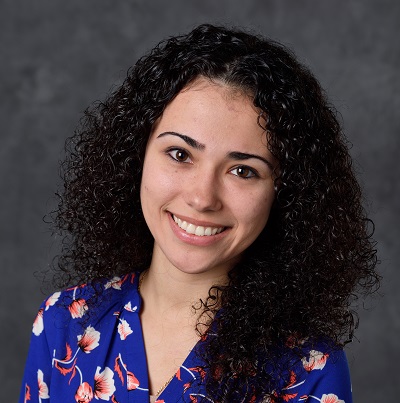
Sylmarie Davila-Montero is a doctoral candidate pursuing a degree in electrical engineering, in the College of Engineering. From a young age, Davila-Montero was inspired to study in the STEM field by her parents, one of which works in the healthcare field and the other as an electrical engineer.
“My motivation to pursue an advanced degree in STEM came from my desire to help people and my curiosity about medicine and engineering,” Davila-Montero said. “For me, being an engineer was not enough, I wanted to be an expert in how to apply engineering to medicine and, more importantly, how to use that knowledge to help those in need.”
Her current research focuses on the development of hardware-efficient neural processing algorithms for the next generation of neural interfaces, including algorithms for the treatment of neural signals recorded using high-channel count microelectrode arrays and high-density electrocorticography (ECoG) arrays.
“My interest in this research came from the fact that neural interfaces can help physically disabled individuals regain control of their environment,” Davila-Montero said. “When you see a person that has a desire to grasp a glass of water but lacks his or her extremities, you can apply engineering to augment that person’s physical capabilities. By recording neural signals from his or her brain, and using algorithms to convert those signals to motor commands of which a robotic hand can understand, that person will be able to grasp the glass of water with confidence. I think that being able to work with this type of technology, as well as understanding part of how the brain works, is just amazing and rewarding to help those in dire need!”
Davila-Montero said she hopes her research will allow her to design technology that will allow neuroscientists to better understand how the brain works and to develop technology that will improve the quality of life of individuals with severe disabilities.
“As a Puerto-Rican woman, I have grown professionally, academically and, at times, served as a role model to other young women in engineering in the time I have been enjoying science, technology, engineering and mathematics (STEM) fields,” she said. “As part of my contribution to motivating young minds, I helped develop the Alliance for Increasing the Participation of Females in Engineering (AIPFE) at the University of Puerto Rico at Mayaguez. This is an organization that intends to educate female high school students on how electrical and computer engineering fields impact their day-to-day lives in order to motivate and inspire them to enter these exciting fields.”
At MSU, Davila-Montero participated in the development of a workshop entitled, “Exploring Microcomputers,” which has been presented for two consecutive years to 4th-8th grade girls from around the state of Michigan in the “Introduce a Girl to Engineering Day” activity held by the Institute of Electrical and Electronics Engineers (IEEE) Women in Engineering society.
The National Science Foundation Graduate Research Fellowship award consists of a three-year annual stipend of $34,000, along with a $12,000 cost of education allowance for tuition and fees. Davila-Montero said she plans to use this award to further advance, and positively contribute, research in the area of neural interfaces.
“Receiving this award is such an honor,” Davila-Montero said. “It means I now have the flexibility to do research in my area of preference for three years without worrying about external funding. I aspire to become one of the nation’s top leaders in education to help bring future generations to the table to fall in love with the wonders of science and engineering. Being awarded an NSF Graduate Fellowship greatly support and help transform my dreams into reality.”


